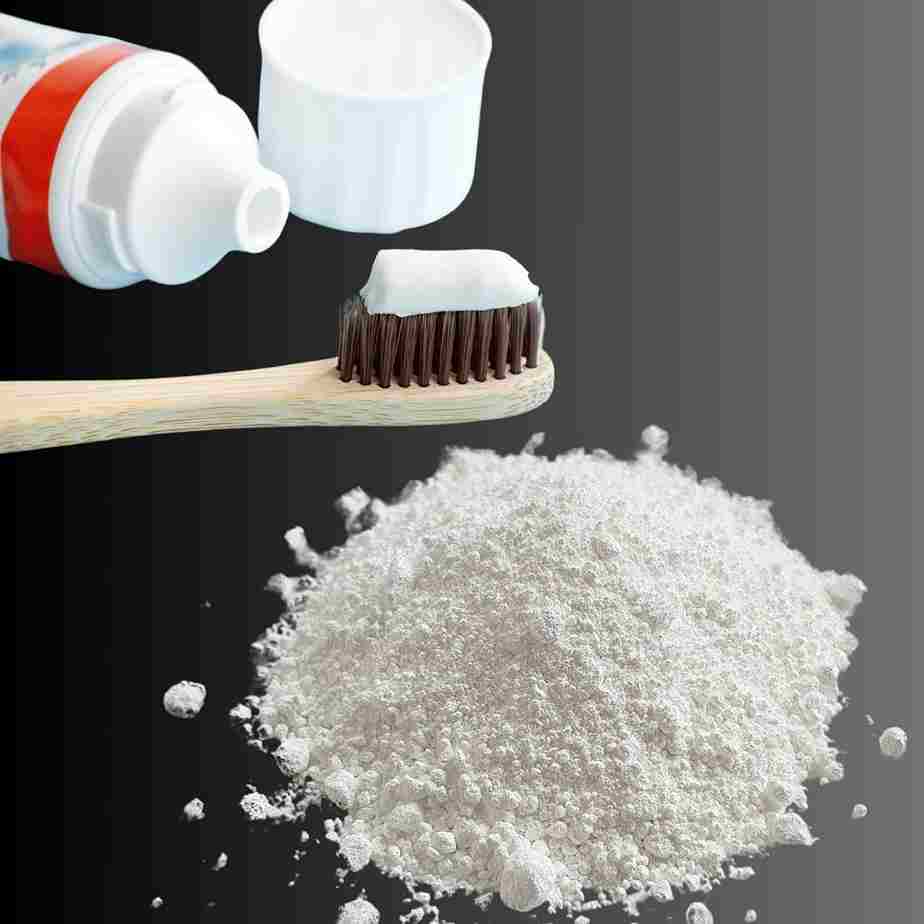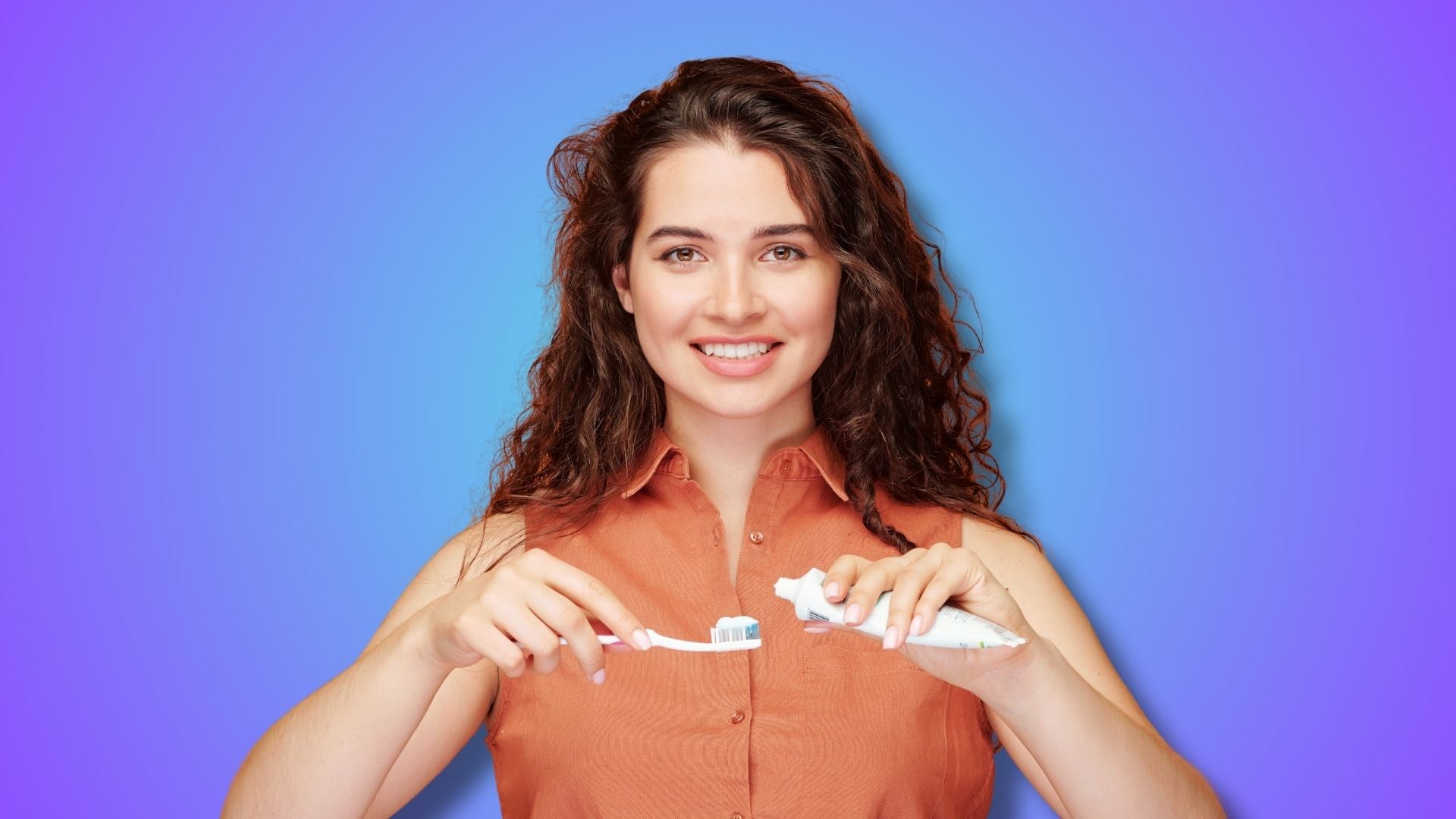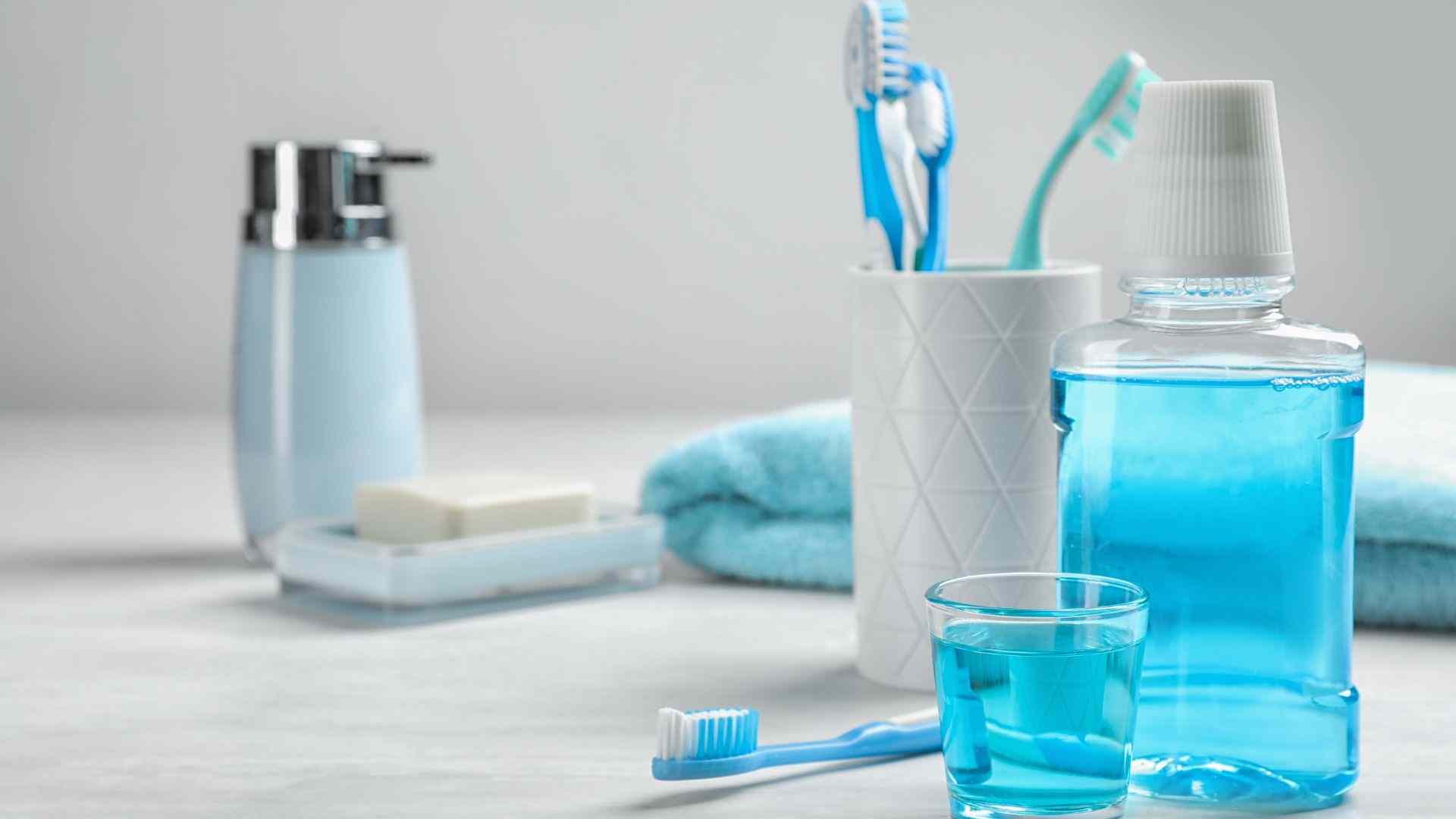Pros and Cons of Fluoride Toothpaste
Fluoride is a common ingredient included in toothpaste to fight tooth decay, but it's also a controversial one.
By integrating fluoride into your daily routine, through means such as drinking fluoridated water, using fluoride toothpaste, and occasionally rinsing with a fluoride mouthwash, you actively strengthen your tooth enamel.
This not only makes it more resistant to acid attacks from plaque bacteria and sugars but also helps reverse early signs of tooth decay.
However, it's crucial to strike the right balance with fluoride use, especially for young children, to avoid the risk of dental fluorosis, a condition marked by mild discoloration of the teeth due to excessive fluoride intake during enamel formation.
While fluorosis is mostly a cosmetic issue, it underscores the importance of monitoring fluoride levels, particularly in children. Further, while rare, consuming high amounts of fluoride in a short period can lead to toxicity, with symptoms ranging from nausea to more severe health issues.
For these reasons, many families are switching to xylitol toothpaste and nano hydroxyapatite toothpaste to keep their teeth healthy without potential the side effects associated with fluoride.
In this article, I'll explain everything you need to know about the pros and cons of fluoride toothpaste.
What is fluoride
Fluoride is a naturally occurring mineral found in soil, water, and certain foods. In oral care products, fluoride is added in the form of sodium fluoride, sodium monofluorophosphate, or stannous fluoride to help prevent tooth decay and cavities.
Fluoride toothpaste is a type of toothpaste that contains fluoride as its active ingredient. It works by incorporating fluoride ions into your enamel, making it stronger and more resistant to acid attacks from plaque-causing bacteria.
This process, known as remineralization, strengthens the enamel and reduces the risk of tooth decay.
Additionally, fluoride toothpaste may also inhibit the growth of bacteria in the mouth and reduce the production of acids that can erode tooth enamel, further contributing to cavity prevention.
Regularly using remineralizing toothpaste with fluoride or nano hydroxyapatite alongside expandable floss, tongue scraping, and using alkaline mouthwash can help support overall oral health and reduce your risk of developing tooth decay.
Why is fluoride in our toothpaste?

Fluoride has long been regarded as the gold standard in toothpaste due to its ability to prevent cavities and promote oral health.
Initially discovered for its cavity-preventing properties, fluoride was widely adopted in oral care products and public health initiatives, including water fluoridation programs. The implementation of fluoride in water supplies significantly reduced cavity rates and improved dental health outcomes across populations.
However, advancements in technology and scientific understanding have led to the development of alternatives like nano hydroxyapatite, which offer comparable remineralization potential without some of the potential side effects associated with fluoride.
While fluoride remains effective in strengthening enamel and inhibiting bacterial growth, concerns have arisen regarding its long-term safety and potential adverse effects, such as skeletal fluorosis and cognitive impacts in children.
As research continues to evolve, there is growing recognition of the need to explore alternative approaches to dental care that balance efficacy with safety.
Nano hydroxyapatite, a more effective derivative of hydroxyapatite, has emerged as a better alternative to fluoride toothpaste due to its safety profile.
How does fluoride work?

Fluoride toothpastes work primarily by remineralizing and strengthening tooth enamel, which is the protective outer layer of our teeth.
When you brush with fluoride toothpaste, fluoride ions can be absorbed into the enamel, forming a compound known as fluorapatite. This compound is more resistant to acid attacks from bacteria in plaque and reduces your chances of enamel demineralization and developing tooth decay.
Additionally, fluoride can repair early stages of tooth decay and control dental caries by promoting remineralization, where minerals are deposited back into areas of weakened enamel, restoring its strength.
Furthermore, fluoride can inhibit the growth of bacteria that cause dental plaque and reduce their ability to produce acids that can erode tooth enamel. By disrupting the bacteria's metabolic processes, fluoride supports a balanced oral environment and reduces your risk of developing cavities.
That said, it's worth noting that you cannot remineralize a cavity once it has already formed.
Overall, fluoride works through multiple mechanisms, including:
-
strengthening enamel
-
promoting remineralization
-
inhibiting bacterial growth
-
and reducing acid production,
making it an effective tool in preventive dental care.
What are the different types of fluoride?

Fluoride is a key mineral in preventing tooth decay and strengthening tooth enamel, and it comes in various forms to suit different needs and preferences. Here's a look at the different types of fluoride applications:
-
Toothpaste: Fluoride toothpaste is the most common and convenient way to apply fluoride daily. Available for both children and adults, it provides a topical fluoride treatment that helps remineralize enamel and prevent cavities.
-
Mouthwash: Fluoride mouthwashes offer an additional way to protect your teeth against decay, especially for those who may be at higher risk. Used after brushing, they can help reach areas that might be missed by a toothbrush, providing an extra layer of protection.
-
Gels: Fluoride gels are often used in professional dental settings or prescribed for home use. They're applied to the teeth with a brush or tray and provide a higher concentration of fluoride than toothpaste or mouthwashes. These are particularly useful for individuals with a high risk of dental caries.
-
Varnishes: Fluoride varnishes are professional treatments applied by a dentist or dental hygienist. They adhere to the teeth for several hours, allowing for a prolonged fluoride uptake. Varnishes are effective in reducing tooth sensitivity and providing a strong protective barrier against decay.
-
Supplements: Fluoride supplements come in tablets, drops, or lozenges and are typically recommended for children living in areas without fluoridated water. They're used to help prevent tooth decay from within, providing systemic benefits.
-
Water Fluoridation: This is the process of adding fluoride to the public water supply to a level that helps reduce tooth decay. It's considered one of the most effective, efficient, and cost-effective methods of fluoride delivery, benefiting entire communities.
Each type of fluoride application serves a specific purpose and offers benefits for dental health. The choice among them depends on individual needs, risk factors for decay, and personal preferences.
Pros of Fluoride Toothpaste

Fluoride toothpaste offers several benefits for our oral health. First, fluoride helps strengthen tooth enamel, making it more resistant to acid attacks from bacteria in the mouth, thus reducing your risk of tooth decay and cavities.
Additionally, fluoride can remineralize weakened enamel, potentially reversing the early stages of tooth decay and preventing further damage. Further, fluoride toothpaste can inhibit the growth of harmful bacteria in our mouths, reducing plaque formation and the risk of gum disease.
Let's walk through some of the key benefits of fluoride toothpaste now.
Remineralization
Remineralization is a crucial process in maintaining strong and healthy teeth. When tooth enamel becomes demineralized due to acid attacks from bacteria in the mouth or acidic foods and beverages, it loses essential minerals like calcium and phosphate.
Remineralization involves the replenishment of these lost minerals, effectively strengthening the enamel and reversing the early stages of tooth decay. Two of the most popular remineralizing agents in toothpaste are nano hydroxyapatite and fluoride.
When you brush, fluoride toothpaste facilitates remineralization by enhancing the absorption of calcium and phosphate ions into the enamel surface. This strengthens the enamel, making it more resistant to acid attacks and preventing further decay.
Additionally, fluoride can protect your teeth by forming a protective layer over the enamel, shielding it from harmful bacteria and acidic substances in your mouth. By promoting remineralization, fluoride toothpaste helps maintain the integrity of the tooth structure, reducing your risk of cavities and preserving overall oral health.
Reversing Tooth Decay
Like nano hydroxyapatite, fluoride prevents tooth decay and can even reverse it thanks to enamel remineralization.
When our teeth are exposed to acids from bacteria in the mouth or acidic foods and beverages, they lose essential minerals like calcium and phosphate, leading to demineralization and the early stages of tooth decay. Fluoride toothpaste contains fluoride ions, which strengthen and remineralize our enamel by attracting calcium and phosphate ions back into the tooth structure.
This process effectively reverses the damage caused by acid attacks, restoring the minerals lost during demineralization and making the enamel stronger and more resistant to decay.
Preventing Bacteria Growth
When bacteria in our mouths feed on sugars from food and beverages, they produce acids that can attack the enamel of our teeth, leading to decay and cavities. Fluoride toothpaste inhibits the growth of these harmful bacteria by creating an environment that is less favorable for their proliferation.
By reducing the number of bacteria in the mouth, fluoride toothpaste helps to minimize the production of acids and the formation of plaque, thereby lowering the risk of tooth decay and gum disease.
So, when you use fluoride toothpaste or nano hydroxyapatite toothpaste regularly, you're not only cleaning your teeth but also actively protecting them against harmful bacteria.
Reducing Plaque Formation
Reducing plaque formation is a significant benefit of fluoride toothpaste that directly contributes to better oral health.
Plaque is a sticky film of bacteria that forms on the surface of our teeth throughout the day, particularly after eating or drinking. If left unchecked, plaque can lead to tooth decay, gum disease, and other oral health issues.
Fluoride toothpaste inhibits the formation of plaque by disrupting the ability of bacteria to adhere to the tooth surface. By reducing plaque buildup, fluoride toothpaste helps to prevent the development of cavities and keeps your teeth and gums healthy.
Cons of Fluoride Toothpaste

Fluoride, when used in appropriate amounts, is generally safe and effective for strengthening teeth and promoting overall oral health. However, too much fluoride intake can lead to potential side effects.
Dental Fluorosis
Dental fluorosis is a condition that affects the appearance of tooth enamel, typically occurring during the early stages of tooth development in childhood.
It manifests as white streaks or spots, brown discoloration, or pitting on the tooth surface. Dental fluorosis occurs when children ingest too much fluoride during tooth formation, often from swallowing fluoride toothpaste or consuming fluoridated water in excess.
While mild forms of dental fluorosis may be barely noticeable, severe cases can lead to significant aesthetic concerns and may require cosmetic dental treatment to improve the appearance of affected teeth.
Skeletal Fluorosis
Skeletal fluorosis is a bone disorder caused by long-term exposure to high levels of fluoride, typically from drinking water with naturally occurring fluoride concentrations above recommended levels.
In skeletal fluorosis, fluoride accumulates in the bones, leading to changes in bone density and structure. Symptoms of skeletal fluorosis may include joint pain, stiffness, and skeletal deformities.
While skeletal fluorosis is rare in areas with controlled fluoride levels, it remains a concern in regions where natural fluoride levels are high or in populations with excessive fluoride exposure.
Fluoride Toxicity
Fluoride toxicity occurs when individuals ingest large amounts of fluoride, either accidentally or intentionally. This can happen through the ingestion of fluoride-containing products such as toothpaste or mouthwash, especially by young children who may swallow these products instead of spitting them out.
Symptoms of fluoride toxicity may include nausea, vomiting, abdominal pain, diarrhea, and in severe cases, convulsions and cardiac arrhythmias.
While acute fluoride toxicity is rare, it can occur in cases of accidental ingestion of concentrated fluoride products or intentional misuse of fluoride supplements.
Should kids use fluoride?

Yes, fluoride toothpaste is generally considered safe for children when used appropriately and under adult supervision.
The American Academy of Pediatrics (AAP) recommends using fluoride toothpaste for children as soon as their first tooth erupts. However, the amount of toothpaste used should be minimal, no more than a smear or rice-sized amount for children under three years old, and a pea-sized amount for children aged three to six years.
This helps minimize the risk of swallowing too much fluoride, which can lead to dental fluorosis if ingested in excess during the tooth development stage.
Unfortunately, research suggests there are some risks involved with fluoride toothpaste for kids, however. For example, one study reported, "the accidental swallowing of fluoridated toothpaste in children may be 2–3 times the safe limit, suggesting that use of fluoridated toothpaste may be a risk factor for dental fluorosis".
For this reason, many parents are switching to kids hydroxyapatite toothpaste as a safer alternative to fluoridated toothpaste.
Should adults use fluoride?

Yes, whether it be nano hydroxyapatite or fluoride, adults should use a remineralizing toothpaste as part of their oral hygiene routine.
In this case, fluoride plays a crucial role in fighting tooth decay and strengthening tooth enamel, benefits that are important throughout your life. It works by remineralizing enamel, and repairing early decay before it progresses to cavities.
Additionally, fluoride helps make your teeth more resistant to the acids produced by plaque bacteria, and sugars in your mouth. This protective barrier is essential not just for children, whose developing teeth gain a lot from fluoride exposure, but also for adults, who continue to face threats to their oral health such as decay, gum disease, and everyday wear and tear.
That said, due to the side effects of fluoride, many people choose to avoid fluoride in toothpaste. In fact, fluoride might be one of the most commonly avoided ingredients in toothpaste.
Because of this, many people are switching to fluoride free toothpaste with nano hydroxyapatite which provides all of the same remineralization benefits without adverse effects.
Is fluoride in toothpaste good or bad?
Fluoride in toothpaste is generally considered good for dental health when used appropriately. Fluoride strengthens tooth enamel, making our teeth more resistant to acid attacks from plaque bacteria and sugars in the mouth.
This can help prevent tooth decay and cavities, leading to improved oral health overall. Additionally, fluoride has been shown to promote remineralization, the process of replacing lost minerals in tooth enamel, which can reverse early stages of tooth decay.
However, excessive fluoride intake, particularly during early childhood when teeth are still developing, can lead to dental fluorosis, a condition characterized by white or brown spots on the teeth, and skeletal fluorosis. Therefore, many people prefer to use nano hydroxyapatite, a safe and effective alternative to fluoride.
Is fluoride a toxic ingredient?
According to the American Dental Association, Fluoride is generally not considered a toxic ingredient when used appropriately and in recommended amounts for certain populations.
It has been extensively studied and recognized by leading health organizations, including the American Dental Association (ADA) and the World Health Organization (WHO), for its effectiveness in preventing tooth decay and promoting oral health.
Fluoride occurs naturally in water sources and is also added to dental products like toothpaste and mouthwash to help strengthen tooth enamel and reduce the risk of cavities. However, excessive fluoride intake can lead to dental fluorosis, a condition characterized by white spots or streaks on the teeth, or skeletal fluorosis.
Additionally, research suggests that fluoride intake is associated with lower IQ scores in children.
While fluoride is commonly used in toothpaste for its ability to prevent tooth decay and strengthen enamel, you may prefer fluoride-free alternatives due to concerns regarding potential adverse effects associated with fluoride exposure. For example, those with fluoride sensitivities or allergies may experience discomfort or irritation when using fluoride-containing toothpaste.
Further, parents and pregnant women may opt for fluoride-free toothpaste formulations to maintain good oral health without the potential drawbacks associated with fluoride exposure. Thankfully, fluoride-free toothpaste with nano hydroxyapatite exists as a safe and effective alternative to fluoridated toothpastes.
Nano hydroxapatite is an inorganic chemical compound that closely mimics that natural composition of our teeth and bones. Not only are hydroxyapatite-based toothpastes safe, but nano hydroxyapatite is equally as effective as fluoride at remineralization and improving oral hygiene.
How much fluoride do you need?
The amount of fluoride needed depends on age, oral health, and the presence of cavities.
Studies suggest that adults should use a pea-sized amount of fluoride toothpaste for optimal protection against tooth decay. Fluoride helps strengthen enamel and prevent cavities when used properly.
However, too much fluoride can cause dental fluorosis, especially in children, leading to white spots or streaks on teeth. For children under 6, it's recommended to use only a small amount, about the size of a grain of rice.
Research indicates that daily use of fluoride toothpaste is effective, but overuse can be harmful over time. If you prefer a fluoride-free option, nano-hydroxyapatite toothpaste is a great alternative, as it strengthens enamel and prevents tooth decay without the risks of fluoride.
Is fluoride free toothpaste effective?
Fluoride-free toothpaste can clean your teeth and help maintain good oral hygiene, but it's important to understand that it may not offer the same level of cavity protection as fluoride toothpaste.
Fluoride is a key ingredient in many toothpastes because of its proven ability to strengthen tooth enamel and protect against decay. It works by remineralizing enamel, repairing early decay, and making teeth more resistant to the acids that cause cavities.
If you're considering switching to a fluoride-free option, it's crucial to look for toothpastes that contain alternative ingredients like xylitol or nano hydroxyapatite, which can still support oral health by reducing bacteria and plaque.
What's the best alternative to fluoride toothpaste?
A safer alternative to fluoride toothpaste and professional fluoride treatments is nano hydroxyapatite thanks to its biomimetic nature and natural enamel strengthening properties. Not only is nano hydroxyapatite safe for adults to use, it is even safe to be swallowed by children.
In fact, one study found, "swallowed HA particles are immediately dissolved in the acid environment of the stomach and do not pose any safety concern." Further, research states that there is no literature reporting any systemic or adverse effects of hydroxyapatite containing toothpastes.
Nano hydroxyapatite particles do not induce toxicity the way overconsumption of fluoride can. This is particularly important for certain populations such as:
-
pregnant women
-
children
-
people prone to tooth decay and cavities
-
and people who live in environments with high fluoride concentrations in the water.
That's why many people are turning to nano hydroxyapatite as a safe, non toxic toothpaste alternative to dental fluoride. When using nano hydroxyapatite, you don't have to worry about how much fluoride is safe to use.
Frequently Asked Questions
What are the disadvantages of fluoride toothpaste?
Too much fluoride can cause dental fluorosis, leading to tooth discoloration. Long-term exposure to high levels may also affect bone health. Pregnant women should be cautious, as excessive fluoride intake could pose risks to the fetus. A safer alternative is fluoride-free toothpaste with nano-hydroxyapatite, which strengthens enamel without these risks.
Why avoid fluoride toothpaste?
Avoiding fluoride toothpaste might be a consideration due to concerns about potential adverse effects associated with excessive fluoride intake. These concerns include the risk of dental fluorosis, especially in children, which can cause tooth discoloration or mottling. Prolonged exposure to high levels of fluoride can also lead to skeletal fluorosis, impacting bone health. Pregnant women may be particularly cautious due to potential neurological risks to the developing fetus from excess fluoride intake. Using fluoride toothpaste with moderation and under supervision, especially for children, is important to mitigate these risks. Alternatively, fluoride-free toothpaste with nano hydroxyapatite can offer similar benefits for dental health without the potential drawbacks of fluoride.
Is toothpaste better with or without fluoride?
While fluoride toothpaste is praised for its effectiveness in preventing cavities and strengthening tooth enamel by promoting remineralization, some individuals opt for fluoride-free alternatives due to concerns over dental fluorosis or a desire for natural ingredients, opting instead for ingredients like nano hydroxyapatite, which also supports enamel health. Ultimately, the best choice varies by personal health goals, dietary fluoride intake, and specific dental conditions, and it's often beneficial to discuss this decision with a dental professional.
What are the negative side effects of fluoride?
The negative effects of fluoride primarily revolve around overexposure. Excessive fluoride intake, particularly during early childhood, can lead to dental fluorosis, causing discoloration or mottling of teeth. In severe cases, prolonged high fluoride exposure can result in skeletal fluorosis, affecting bone health. Additionally, some individuals may experience gastrointestinal discomfort or allergic reactions to fluoride-containing products. It's important to use fluoride products as directed and to monitor intake to avoid these potential adverse effects.
Why do dentists push fluoride?
Dentists advocate for fluoride use primarily because of its proven benefits in preventing tooth decay and strengthening tooth enamel. Fluoride helps remineralize weakened tooth areas, effectively reducing the risk of cavities by making teeth more resistant to acid attacks from bacteria and sugars in the mouth. It also reverses early decay. This mineral's ability to significantly improve oral health and reduce dental caries has been well-documented in numerous studies, making it a cornerstone of dental care recommendations. Dentists push for fluoride use to ensure their patients maintain optimal oral health and minimize the need for more invasive dental treatments.
What are the benefits of fluoride?
Fluoride strengthens tooth enamel, repairs early decay, and reduces the risk of cavities, promoting long-term oral health. However, excessive use, particularly in children, can lead to dental fluorosis, causing white spots or streaks on teeth. To maximize benefits and minimize risks, use nano hydroxyapatite toothpaste and follow your dentist's recommendations.
Is it good to put fluoride on your teeth?
Yes, fluoride is beneficial for your teeth as it helps strengthen enamel, prevents tooth decay, and can even reverse early signs of cavities. It is commonly used in toothpaste and professional treatments to enhance oral health. However, it's important to use it in the right amount, as excessive fluoride can lead to dental fluorosis, especially in young children.
What are the health risks of fluoride?
While fluoride is beneficial for oral health, excessive exposure can lead to health risks. Overuse, particularly in children, may cause dental fluorosis, resulting in white spots or streaks on the teeth. In extreme cases, prolonged overexposure can lead to skeletal fluorosis, affecting the bones and joints. It’s important to use fluoride free containing products and consult a dentist to avoid these potential risks.
Is it OK to use fluoride everyday?
Using fluoride toothpaste every day is generally safe and recommended for maintaining oral health. It helps prevent tooth decay, strengthens enamel, and reduces cavities. However, excessive fluoride use, especially in children, can lead to dental fluorosis, so it's important to use nano hydroxyapatite toothpaste for the safe and effective experience.






















